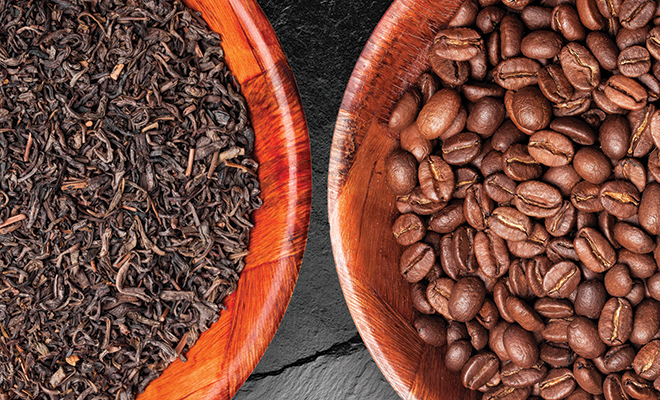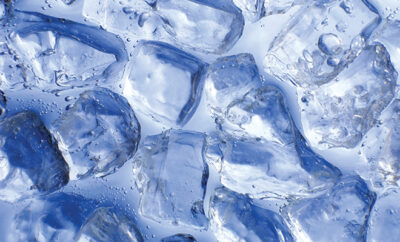
Coffee or Tea? The Battle of the Beverages
These common pick-me-ups are two of the most widely consumed beverages in the world. But when it comes to health and wellness, is one better than the other? The robust deliberation continues here. See how your favorite drink fares with this fun comparison.
Spilling The Beans on Coffee
Coffee is a quintessential part of daily American life. According to a study by Statista, 88 percent of Americans drink between one and five cups of coffee a day. And America isn’t the only country loving the likes of lattes. Most of the world’s ten leading coffee-consuming countries are in Europe, but Brazil tops the list. This should come as no surprise for coffee connoisseurs since it is also the biggest coffee-producing country in the world. Of course, the U.S. is the largest coffee importer; we need all those beans to supply some of the biggest coffee chains in the world.
While there’s nothing like a steaming cup of coffee to give you instant energy in the morning, or the stamina to pull an all-nighter, coffee is scientifically linked to a long list of possible health benefits, giving us another reason to make it a venti.
Benefits of Coffee
• Excellent source of antioxidants that may play a role in preventing several chronic and acute conditions.
• Enhances energy levels.
• Reduces risk of Type 2 diabetes.
• Promotes more physical movement.
• Enhances heart health.
• Reduces risk of liver disease, Parkinson’s and Alzheimer’s.
• Promotes healthier skin and decreased body fat.
Tea
Around the world, tea takes the cake for being the most popular beverage, after water, of course. Globally, almost 6.8 billion kilograms of tea are consumed per year, and with over 3,000 tea varieties, people are filling their cups again and again. The vast popularity of tea is driven by its distinct taste and increased awareness of its numerous health benefits.
Benefits of Tea
• Research has shown a reduced risk of heart disease in people who drink green or black tea regularly.
• Helps keep blood sugar in check, reducing the risk for developing Type 2 diabetes.
• Offers several antioxidants with green tea providing an extra punch.
Some Cons of Coffee and Tea
Along with benefits of these stimulating beverages comes possible risks, mostly from drinking too much. Caffeine overload can cause nervousness, restlessness and poor sleep. Some people may also experience loose stools and other gastrointestinal issues from too many cups of joe or tea. Nausea, abdominal pain, heartburn, dizziness and muscle pain are also potential side effects.
Overconsuming coffee and tea may also interact with certain medications, increasing their effects in the body. Most doctors recommend not exceeding a total daily intake of 400 milligrams of caffeine, which is about four cups of brewed coffee or eight cups of green tea.
The Future of Your Favorite
Whether you side with coffee or tea, or partake in both, the making of these beverages and the way they are served continues to evolve with the wants of the world. This year, coffee trends are geared toward our busy lives, with cold coffee reigning supreme as an easy on-the-go drink. And while frothy milk is a popular topper, look for cold foam to take the lead. Social media is also presenting some creative ideas with food-topped coffees. Think dried strawberries crumbled on a strawberry latte or sprinkles of apple pie atop an oatmeal milk cappuccino. Coffee shops are also pursuing sustainability in their practices; look for more discounts for customers using their own mugs.
Teas are progressing, too. Health-conscious consumers are giving a nod to moringa tea. Made from the leaves of the moringa plant, this tea is said to offer nutritional benefits including vitamins A, C and B6 as well as beta-carotene and amino acids. On-trend tea shops may also offer Pu-erh tea, a higher-caffeinated version closer to the jolts of coffee, and honeybush tea, an herbal infusion from South Africa known for its honey-like flavor.
Pick Your Passion
Trends come and go, but our love of coffee and tea is continuous. While more research is needed to identify all the benefits, both tea and coffee can be part of a healthy diet. Whatever your pick of liquid potion, you are sure to be a winner with either of these two popular everyday drinks. A good cup of our best-loved beverage can make us feel better, give us clarity and even extend our life if paired with a healthy lifestyle. When it comes to the battle of the beverages, between coffee and tea, your choice wins the contest.
Sources: webstaurantstore.com, eatright.org and webmd.com.







